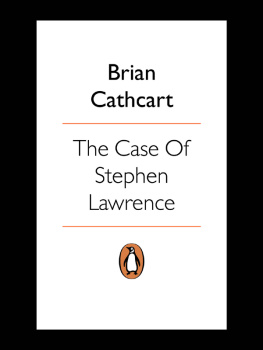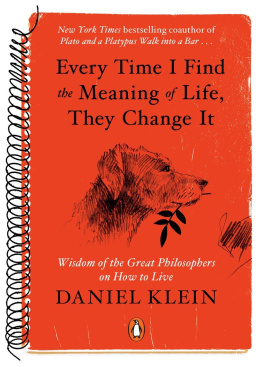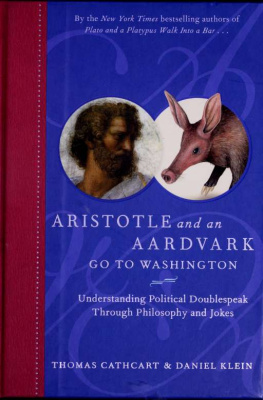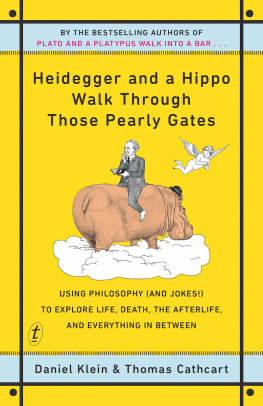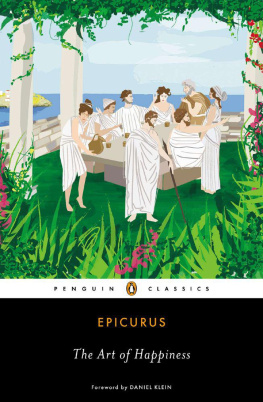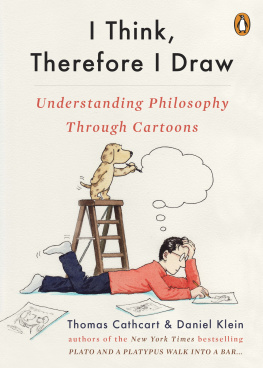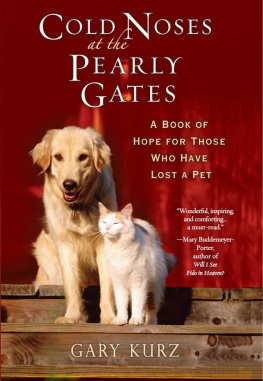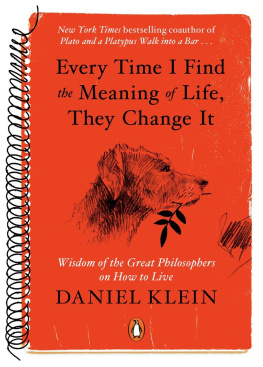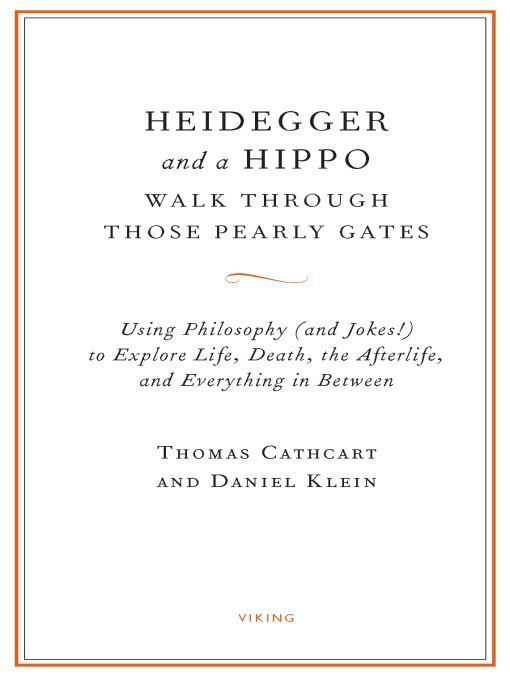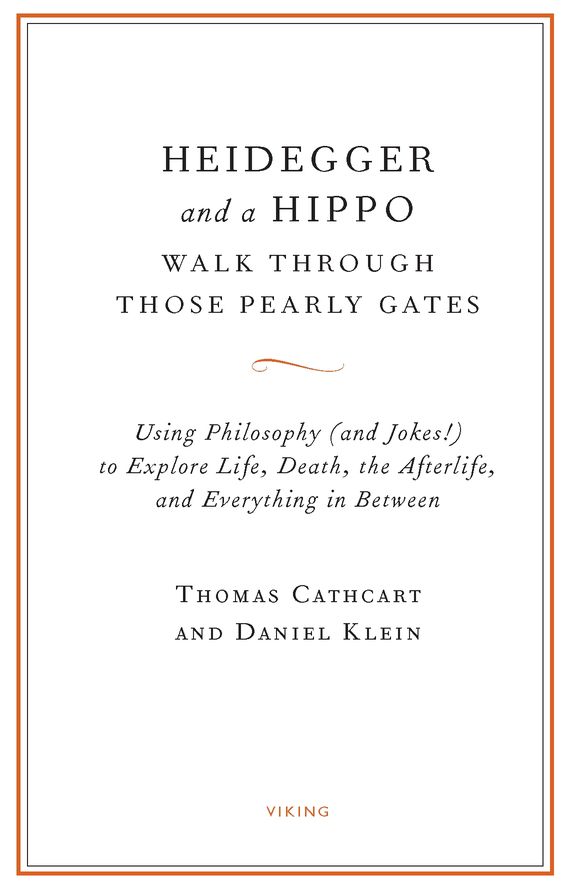Table of Contents
For our philosophical mentor,
WOODY ALLEN,
whose astute phenomenological analysis
rings true to this day:
It is impossible to experience one s own death
objectively and still carry a tune.
INTRODUCTION
Excuse us, but can you spare a moment? We re taking a survey here and wed like to ask you a question. Itll only take a minute and we wont even ask your name, okay? So here it is:
Do you really think youre going to die?
Really and truly?
Do you really think your life is going to come to an end some day?
Take your time. No hurry to answer. Well, except for the fact that every moment that passes is one less moment in your lifetime.
If youre anything like us, you probably dont totally believe that the final curtain will come down one day. We can sort of grasp the fact of death in general, but in particular? Not so much. Were like the Armenian-American writer William Saroyan, who wrote in a letter to his survivors,
Everybody has got to die, but I always believed an exception would be made in my case.
On the other hand, we cant quite get death completely out of our minds. Hard as we try to repress thoughts of our mortality, they keep popping up like those little furry heads in a Whack-a-Mole. That must be because death is one of the immutable facts of human life.
We are the only creatures who comprehend that we are going to die and we are also the only creatures who can imagine living forever. Its that combo that drives us crazy. Death scares the hell out of us. And a life that doesnt clearly have a destinationexcept over a cliffseems devoid of meaning. This is undoubtedly why human mortality is intertwined with the fundamental questions of philosophy.
Questions like: What is the meaning of lifeespecially if its all going to end one day? How should our consciousness of death affect the way we live our lives? Would life have a radically different significance if we lived forever? After a millennium or two, would we be overcome by existential boredom and long for an end to it all?
Do we have soulsand if so, do they survive our bodies? What are they made of? Is yours better than mine?
Is there another dimension of time that cuts through the cycle of birth and death? Is it possible to live forever by always living in the present moment?
Is Heaven a place in time and space? If not, where and when is it? And what are the odds of getting in?
These are the kinds of questions that prompted us to sign up for our first philosophy courses some fifty years ago. But for better or worse, we got sidetracked by professors who told us that before we could tackle the Big Questions, we had to clear up some mind-numbing technical minutiae. Questions like: Does Bertrand Russell confuse possible necessity with necessary possibility?
Whaa??
Meanwhile, time was passing and we were still going to die. Eventually, we found our way back to those Big Questions in courses in metaphysics and theology, ethics and existentialism.
But immediately another obstacle arose: honestly contemplating our own death scared us to death. We couldnt look the Reaper straight in the face without, well, fear and trembling. But we couldnt avert our eyes either. Death: you cant live with it, you cant live without it.
Whats a person to do?
How about telling a joke? Hey, it couldnt hoit.
Millie accompanied her husband Maurice to the doctors office. After he had given Maurice a full checkup, the doctor called Millie into his office alone. He said, Maurice is suffering from a serious disease brought on by extreme stress. If you dont do the following, your husband will die. Each morning, wake him up gently with a big kiss, then fix him a healthy breakfast. Be pleasant at all times and make sure he is always in a good mood. Cook him only his favorite meals and allow him to relax after eating. Dont burden him with any chores, and dont discuss your problems with him; it will only make his stress worse. Dont argue with him, even if he criticizes you or makes fun of you. Try to relax him in the evening by giving him massages. Encourage him to watch all the sports he can on TV, even if it means missing your favorite programs. And most importantly, every evening after dinner do whatever it takes to satisfy his every whim. If you can do all of this, every day, for the next six months, I think Maurice will regain his health completely.
On the way home, Maurice asked Millie: What did the doctor say?
He said youre going to die.
Somehow hearing about mortality from Millie makes it more bearable. Jokes are funny that way: they can make a devastating point while defusing anxiety at the same time. Thats why there are so many jokes about sex and deathboth of them scare the pants off us.
Happily, we happen to know a lot of jokes. In fact, we once discovered that jokes are a neat way to clarify general philosophical ideas, and we even wrote a book about that. So could jokes also illuminate philosophical concepts about life and death, Being and Non-Being, eternal souls and eternal damnation while at the same time alleviating our death-angst?
You betcha!
And thats a good thing, because the time is nigh (weve both recently attained our biblically allotted three score and ten) for us to take an unflinching look at Death and what the big thinkers have to say about it, so were going to need all the laughs we can get. Well be prying open all the coffin lids on this issue, looking not only at the Big D but also at its prequel, Life, and its sequel, the Sweet Hereafter. Well be looking for clues.
Well start off by taking a look at the fabulous ways civilized societies have come up with to deny our mortality, especially through that perennial diehard, organized religion. In particular, well check out Freuds theory of how we create religionsas well as havocin order to support our illusion of immortality.
Next well check in with some nineteenth-century philosophers from northern European countries. (Why arent there any philosophers on the Italian Riviera who write about death?) Well visit with that melancholy Dane, Sren Kierkegaard, who thought the only way to transcend our death-anxiety is to go through it. For Kierkegaard, all of our attempts to suppress our thoughts of death are counterproductive. The one way to get in touch with the eternal is to take the anxiety of nothingness into ourselves. Say it aint so, S!
Then well see what that grim German philosopher Arthur Schopenhauer has to say. He virtually patented the concept of


